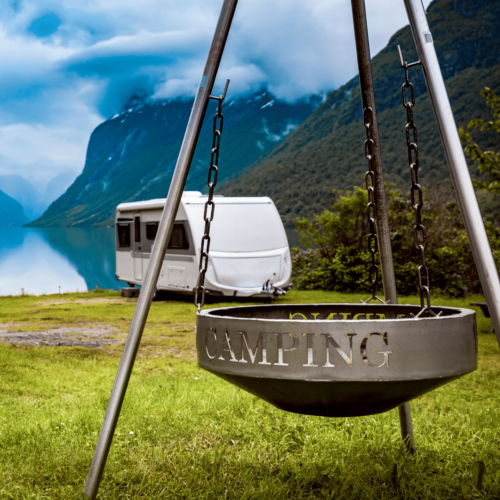Do you enjoy spending time in the great outdoors? The fresh air, the peace and quiet, the lack of any rush and the chance to share precious moments with your favorite people are priceless. Nature offers us immeasurable treasures and it is our responsibility to treat them with care and respect. If you’re wondering how you can be sustainable when camping, here are the seven most important eco-camping tips you should know.
- Camping in the picturesque Allgäu – Discover the most beautiful campsites in the region
- Buying or renting a motorhome: The ultimate checklist for your freedom on wheels
- First-aid kit the checklist for camping
Tip 1: Preparing and planning your camping trip

Careful planning and preparation of your camping trip can not only minimize potential inconveniences, but also help to make your experience in nature more enjoyable, safer and more environmentally friendly. By following the recommendations below, you will ensure that your camping trip runs smoothly.
Important preparation steps for your camping trip
- Find out all you can about your destination: research the campsite and the surrounding region. Familiarize yourself with the local regulations and guidelines to ensure that you comply with all rules and respect nature.
- Pay attention to the weather forecast: By finding out about the expected weather conditions, you can ensure that you pack appropriate clothing and equipment. This helps you to be prepared for all weather conditions.
- Plan your food carefully: take enough food and water with you to cover your needs throughout the trip. This prevents you from having to make unnecessary trips and supports sustainable camping practices.
- Use reusable containers: By using reusable containers, you can not only save space in your luggage and reduce costs, but also avoid waste and thus make a contribution to environmental protection.
- Learn basic outdoor skills: Knowledge in areas such as navigation, first aid and fire safety is essential for a safe and responsible stay in nature. These skills can be invaluable in emergency situations.
Tip 2: Choose hard-wearing surfaces for your camp
Camping in the middle of nature offers unparalleled experiences and views, but choosing the right ground for your tent is crucial to protect the environment while ensuring your comfort. A hard-wearing surface minimizes the impact on the environment and helps to preserve the natural beauty of the site for future visitors.
Sustainable practices for minimal soil pollution
- Follow existing paths: To minimize disturbance to the natural environment, stay on established trails and avoid creating new ones. This helps to keep the vegetation and soil intact.
- Use designated campsites: By camping at official campsites, you prevent damage to vegetation and the ground. These sites are specifically designed to minimize the impact on the environment and often offer additional amenities that can enhance your camping experience.
- Avoid sensitive surfaces: Sensitive surfaces include wet areas, meadows with wild flowers and untouched landscapes. Camping in these areas can cause long-term damage and disrupt natural regeneration.
Tip 3: Guidelines for environmentally friendly waste disposal when camping
Responsible waste disposal is crucial to preserving the natural beauty and purity of the environment in which we camp. Carelessly left litter can not only disfigure the landscape, but also endanger wildlife, pollute water sources and damage sensitive ecosystems. It is therefore of the utmost importance to manage your waste carefully.
Effective strategies for dealing with waste when camping
- Keep your garbage safe: To prevent animals from being attracted by your garbage, always keep it securely and tightly closed. This protects both the animals and yourself.
- Use the designated disposal points: Dispose of all your garbage, including leftover food and other waste, in designated areas. This helps to maintain the cleanliness of the campsite and prevents the contamination of nature.
- Use sanitary facilities correctly: Where possible, campsite toilets should be used for human excrement. If this is not feasible, bury droppings in a hole at least 60 meters away from any water sources, hiking trails and campsites to minimize environmental impact.
- Dispose of toilet paper and hygiene products responsibly: these items should always be thrown in the trash and never left in nature. Even if they are biodegradable products, they can remain visible in natural habitats for a long time and affect wildlife and the ecosystem.
Tip 4: Preserve the naturalness of your camping environment
An essential principle of eco-camping is to leave nature as you found it. This helps to protect cultural sites and preserve the unspoiled natural landscapes for future visitors. It is important that you do not remove or alter any natural or historical objects.
Recommendations for environmentally conscious behavior during your camping trip
- Take photos instead of taking them with you: Capture the beauty of nature in photos instead of taking physical mementos with you. This way, you can share and preserve your experiences without affecting your surroundings.
- Leave only your footprints: This guiding principle is a reminder that your presence in nature should be as minimally visible as possible. Avoid building structures or extracting natural resources. In this way, the landscape remains as you found it for future visitors.
- Respect flora and fauna: Avoid picking plants or disturbing animals in their natural habitat. Every living creature plays an important role in its ecosystem and it is our duty to respect this.
Tip 5: Responsible use of campfires
Campfires are a classic camping activity, but their impact on the environment can be significant. Carelessly managed fires carry the risk of triggering devastating forest fires that not only destroy vegetation but also endanger wildlife habitats. It is therefore important to be particularly careful when handling fire outdoors and to comply with the applicable regulations.
Recommendations for the environmentally friendly use of campfires
- Use existing fireplaces: Give preference to designated fire pits for your campfire. These are designed to minimize the risks of an accidental outbreak of fire.
- Only use dead wood: You should only use dead wood lying on the ground for your campfire. Never take branches or wood directly from trees, as this can damage the ecosystem.
- Keep the fire small: a small fire is sufficient for warmth and atmosphere and is easier to control and extinguish completely. A large fire, on the other hand, carries a higher risk and is more difficult to control.
- Never leave the fire unattended: Even a small fire can quickly get out of control. Make sure you always keep an eye on your fire and never leave it unattended.
- Extinguish the fire thoroughly: Before leaving the area, extinguish the fire completely. The embers should be burnt to ashes and then extinguished with water. Stir the ash and make sure it has cooled down completely before leaving the place.
Tip 6: Respect and protect wildlife
Respect for wildlife is a fundamental aspect of eco-camping. Forests, beaches and mountains are home to many animals, and it is our duty to respect and protect their habitats. Interaction with wildlife requires responsible behavior so as not to disturb the delicate balance of ecosystems.
Guidelines for responsible observation and interaction with wild animals
- Keep your distance: Observe animals from a safe distance. This protects both the animals and yourself. Approaching or feeding wild animals can be dangerous and disrupt their natural behavior.
- Do not disturb habitats: Avoid interfering with the animals’ natural habitats. This includes the destruction or disturbance of nesting sites and resting areas. The conservation of these habitats is crucial for the survival of animal species.
- Avoid noise: Loud noises can frighten and stress animals. Be quiet and reserved so as not to disturb the animals. Exceptions apply, of course, in emergency situations where noise can contribute to your safety.
- Secure food and waste: Carelessly left food and waste can attract and endanger wild animals. Keep your food and waste safe to prevent animals from entering your warehouse. This protects both the animals and your camp from unwanted encounters.
Tip 7: The art of polite camping
Camping is not only a way to get closer to nature, but also a chance to be part of a community of like-minded people. Polite and respectful behavior towards other campers contributes significantly to a positive atmosphere and makes the camping experience more enjoyable for everyone involved.
Recommendations for respectful coexistence in nature
- Be friendly and say hello: A simple greeting or a friendly nod can go a long way towards creating a positive atmosphere. Show openness and courtesy towards other campers.
- Show consideration on hiking trails: Treat other hikers with respect and kindness. If you are walking on narrow paths, make room for oncoming hikers or allow faster people to pass.
- Minimize noise: Excessively loud conversations, music or other noises can disturb the experience of nature for others. Keep the noise level as low as possible, especially in the evening and early morning hours.
- Respect privacy and personal space: Campsites are often cramped, but it is important to respect the privacy and personal space of others. Avoid walking through other people’s campsites or camping too close to someone else’s tent if it is avoidable.
By following these simple tips, you can help make camping a positive and rewarding experience for everyone involved. Polite interaction not only promotes a sense of community, but also helps to make the beauty and tranquillity of nature accessible to everyone.
Conclusion
Camping in the great outdoors is a wonderful way to get away from it all and spend time with our loved ones. In order to make these experiences sustainable, it is important to treat the environment responsibly. The seven eco-camping tips presented include planning and preparing for the trip, choosing the ground, waste disposal, protecting natural and cultural resources, using fire responsibly, respecting wildlife and behaving politely towards other campers. These guidelines help us to protect nature and at the same time enjoy an enriching camping experience. By following these practices, we are helping to preserve the beauty of nature for future generations.
We at Neuss Camping want camping to always be and remain an experience. Our team will of course be happy to help if you need tips and suggestions to make your camping trip an experience.




